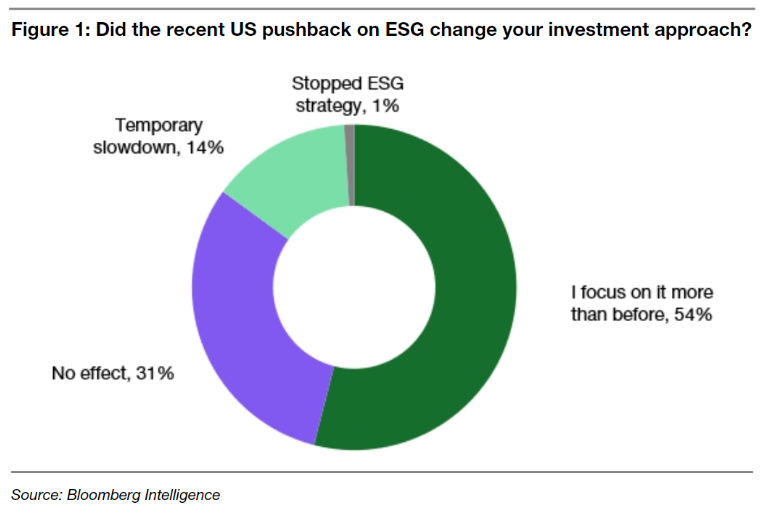Thought of the Week – The backlash against ESG investing seems to go nowhere
In 2023, the backlash against ESG investing gained momentum, particularly in the United States, where conservative politicians and lobby groups have put pressure on the SEC and investors to abandon this approach as 'woke capitalism’. A recent survey of investors and executives shows that this approach seems to be backfiring and that is a good thing for the planet.

Bloomberg Intelligence surveyed 250 institutional investors and 250 high-level corporate executives about their opinions on ESG and the trends they see emerging in 2024 and beyond. One area where there was complete agreement between executives and investors was that ESG investing is not going away.

Asked if the US political pushback against ESG investing has led them to change their efforts in ESG investing, more than half of all investors surveyed (54%) said they are now focusing even more on ESG investing than before, while roughly one in three (31%) said they are not going to change their approach in reaction to the backlash. It seems as if that political pushback is not only going nowhere but suffers from the Streisand effect.

When asked about their spending plans for the next two years, not only did both investors and business executives say they would expand their ESG budgets, but 38% of institutional investors and 23% of business executives said their companies plan to increase their ESG budgets by 20% or more.
This is likely a good thing for the planet because investors paying attention to ESG themes seem to contribute to businesses reducing their greenhouse gas emissions. A group of researchers from the Universities of Leeds and Durham examined what happens when analysts stop covering companies from an ESG angle. To do this, they exploited situations when brokerage companies shut down or merged and hence the number of analysts covering a company was reduced. The results are graphically summarised below. When fewer analysts covered a company, the greenhouse gas emissions started to rise compared to a peer group of companies with similar characteristics.

They identified four channels that contribute to this effect:
- Fewer analysts ask questions about environmental practices in conference calls,
- Institutional investors have a harder time getting environmental information from sell-side analysts,
- A reduction in business spending on pollution abatement technologies, and
- Less stringent corporate oversight related to the environmental goals of the company.
This shows that analysts covering a company from an ESG perspective act as an effective incentive for business leaders to improve their business practices. Hence, as investors increase their ESG budgets and more and more analysts take up ESG criteria as part of their work, we should expect that the pressure on improving ESG practices increases and businesses that ignore these issues will increasingly be penalised in the stock market.
Thought of the Day features investment-related and economics-related musings that don’t necessarily have anything to do with current markets. They are designed to take a step back and think about the world a little bit differently. Feel free to share these thoughts with your colleagues whenever you find them interesting. If you have colleagues who would like to receive this publication please ask them to send an email to joachim.klement@liberum.com. This publication is free for everyone.


